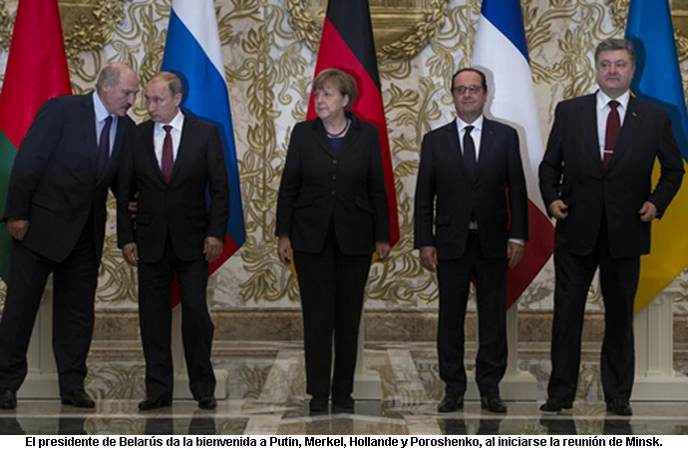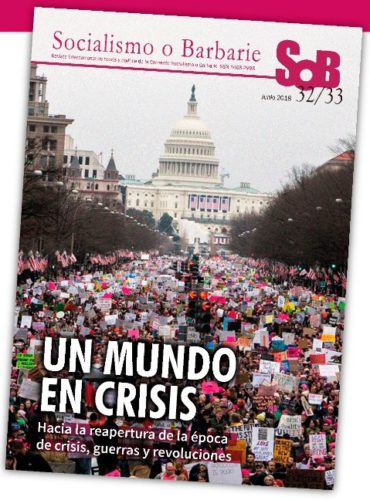
Compartir el post "Minsk Summit: Another agreement between the higher ups that will leave those at the bottom worse off?"
At the closing time of this edition, Wednesday the 11th, -capital city of Belarus- the first meeting of the Summit to reach an agreement of ceasefire in the civil war of Ukraine and, if posible, to settle a more lasting arrangement in this conflict began in Minsk. The conversations will go on tomorrow, it is not clear if an agreement will be reached…and even less if what is signed will be viable in the field.
Vladimir Putin (Russia), Petró Poroshenko (president of Ukraine or, more exactly, part of it), Ángela Merkel and François Hollande (representing the EU) attended this meeting. Representatives of the popular republics of Donetsk and Lugansk (that make up Novorossia) are attending but will not have direct access to meetings. Their representation goes through the filter of Putin.
Without pretending to Paint a whole picture of the situation in Ukraine (and its threads on an international level), we will point out a few important facts.
(Relative) differences between the EU and the USA
The European Union –or rather, those who lead the EU, Germany, first, and far behind it France- have a partial but important difference with the US imperialism.
They both agree in supporting the régime of Kiev. But Germany and France want to reach at any cost a settlement negotiated by Russia that manages to stop the war. In this sense, they are opposed to adding fuel to the fire by massively arming Ukraine and even more so to the OTAN involving itself in the matter.
Economic and political troubles aside, Germany and France doubt –with reason- that the government of Kiev, no matter how many arms they are provided with, will be able to win a war against Novorossia, as long as it has enough support from Moscow. So far, every offensive launched by Kiev was defeated. Now, at this time, the last of them are failing.
Troops from Novorossia in the offensive take the population of Logvinovo, at the encirclement of troops of the army of Kiev.
If the EU and the OTAN get involved in a wider intervention, Germany and France fear that a collapse of Kiev’s troops leaves the European forces facing the perspective of having to interfere one way or another. Because of that, they are also completely opposed to Kiev’s Ukraine entering the OTAN…which would entail a formal commitment to military “defend” it. On the contrary, the USA plans to pull out all the stops…at the expense of their European allies…unless Angela Merkel and François Hollande achieve a complete capitulation in Minsk, the USA pretends to upend in Ukraine a large number of weaponry and “assessors” of the OTAN. It would be a sound business for Washington if it succeeded…if it failed the European Union would be the first to pay for the damage.
This situation puts not only Moscow in a difficult spot, but also the very EU, and particularly its leading imperialisms: Germany and France. But, in that sense, USA’s politics are resumed in the famous phrase –recorded and broadcasted by Kremlin’s spies- “Fuck the EU!” of Victoria Nuland, member of the State Department in Charge of the European Affairs. Now, also, a good clash of the European Union and Moscow would serve Washington to recall theirs minors partners “who’s the boss”.
One year from the “Euro-Maidan”, everything is much worse
However, there is a serious obstacle for Washington’s and its European allies plans. The secession of the Russian speaking East and the subsequent war unleashed by Kiev to stop it, are not the only problems in Ukraine. Everything, on the whole, has worsened. The economy is a catastrophe, and not only because of the war or because of the fact that in this conflict Ukraine has lost its main industrial areas (the Donbasss, where Donetsk and Lugansk are). The subjugation to the European Union has not brought the wellbeing many expected. Not even emigration, even temporary, to look for a job in the EU has become easier. On the contrary, the EU has hardened the rules for the entry to the Schengen Space for bearers of Ukrainian passports.
Ukraine is virtually in a payment cessation. The IMF plans added to the war expenses have entailed severe recessive adjustments. From the raise of 150% of the fares for Kiev’s metro to the shoot up of food prices, real wage has decreased. At the end of autumn of 2014, the price of bread tripled the previous year. At the same time, with the pretext of financing war, the government imposed a big special tax.
The new administration has not modified either a trait that was one of the detonants of the Maidan: the fenomenal corruption of the State. Pilar Bonet, the correspondent of the diary El País of Madrid, who fervorously supports the actual régime, sums it up in this title: “The war and corruption don’t let Kiev breathe”. (1) And adds: “The Ukrainians urge their leaders to put an end to the conflict and to keep their economic promises”.
But it happens that Poroshenko, on the contrary, following the Washington script has been taking meassures only to amplify the war and, simultaneously, put a gag on those who protest.
This situation, on the last weeks has aggravated a phenomenon that has been happening since the beginning: the desertion and above all the resistence to recruiting. In 2015, this last phenomenon has become massive.
A massive rejection of the military service.
The “cannon fodder” of Kiev’s military forces is provided mainly by the youths forced to comply with the military service. Since the conflict in the East began, several drafts have been called. And the percentage that disobeys has also been rising considerably.
An article published in CounterPunch by a journalist from Kiev, Dmitry Kolesnik, puts the situation this way;
“The present war situation in the East of Ukraine and the decision of the government of Kiev to relaunch it by calling in another wave of recruiting, has unleashed a storm of people refusing to go to combat. The protests are growing in every region. Of course there are still nationalist fanatics and extreme right militarists who exercise violence and intimidation against the anti-war protests, but their capacity to quiet them has diminished.” (2)
A big portion of the youths called to active duty, even if they do not protest, are “voting with their feet”, running or hiding to avoid going to ranks:
“The shocking fact- Kolesnik continues- is that almost no one presents themselves voluntarily to the recruitment offices. That’s why this last conscription round is causing a panic in the government and the military high command. They are appealing, as always, to patriotic feelings, but that is falling on deaf ears more and more.
Men of conscription age are fleeing in the thousands, crossing Ukraine’s borders in all directions, or taking cover internally, to escape the clutches of the military recruiters.
“The Ukrainian journal Korrespondent describes the situation as such: ‘Each day, new facts about mass, draft evasion are emerging. In the first wave of military mobilization in 2014, 20 per cent of those who showed up for the conscription call did so voluntarily. In the second wave the same year, it was ten per cent. This year, only six per cent of those conscripts showing up for the call to service have done so voluntarily
The list of places where the youths have fled and/or there have been clashes is unending. We only quote a few examples Kolesnik gives, taken from the journal Korrespondent and other publishings:
In the Transcarpatia oblast, in western Ukraine, whole villages have dispersed through several frontiers (3) to escape the recruiting of their men.
“The chief of the Kosiv vilagge’s council in the Ivano-Frankivsk oblast informs that the whole population of the village rented busses and went to Russia to wait for the war to be over. In the village of Colchino, the authorities could only find three of the 105 men that were to be recruited.
“The Chief of Recruitmen of Transcarpatia, O. Boyko, told the Korrespondent: ‘It may seem a paradox, but in the western oblast of Ternopyk, the people have fled to Russia to scape recruitment’.
“Many people are selecting east European countries as temporary refuges. Yuri Biryukov, an adviser to the Ukrainian president, has admitted, “In the last 30 days, 17 per cent of the total number of reservists of the entire region of Chernivtsy (western Ukraine) have crossed borders into other countries. According to unofficial sources, the hostels and motels in the border area of neighbouring Romania are overcrowded with Ukrainian draft evaders.”
To the south of Ukraine, the situation seems the same: “ The Odessa publication Timer reports that on January 23 in the village of Kulevchi in Saratsky district of Odessa region, the local population revolted against the military mobilization and kicked representatives out of the local recruitment office.
The government has begun to repress these protests, even threatening with martial law. An example of this repression is told by the AFP (Agence-France Press) (4):
“The security service arrested a journalist on charges of ‘high treason’. It’s Ruslan Kotsaba -known TV journalist of the western region of Ivano- Frankivsk, who spread a video through diverse social and mass media, denouncing the new recruitment. He called to evade it and oppose the war…’I’d rather go to prison –says Kotsaba- than to be a part of this fratricide war’. The video uploaded to youtube got 300.000 hits…”
We ratify our position.
We cannot know, exactly, what will come out of the meeting in Minsk. The most likely outcome is a truce -most likely a tenuous one-, given that the military situation of Kiev’s troops seems unsustainable and that, on the other hand, the Kremlin is more interested than ever in “cooling down” the situation. The conjuncture of economic crisis and the threat of more sanctions from the West put pressure in that direction. But Putin’s government cannot appear to the Russian public opinion as “turning his back” on the insurrect republics of the East. He doesn’t want to incorporate them to Russia either (like Crimea), because it would mean to import a politic and social situation that is difficult to control.
In this context, as we’ve previously stated, we defend the Eastern peoples’ right to self-determination, including their right to separation. But the splitting of Ukraine is not our program. We defend a united Ukraine, of the workers, in the context of a socialist and federal republic.
We support unconditionally the right to the peoples of the East of Ukraine to defend themselves from Kiev’s government’s outrage, including their right to self-determination. But also, more than ever, we warn that their separation, the splitting of Ukraine in two, won’t bring any benefits in the long run.
The popular rejection in the East region to continue under the boot of Kiev’s government, that half the country didn’t vote is justifiable and comprehensible. The oligarch Poroshenki pretends to impose an absolute centralism, the proscription of Russian language, the adjustment plan ordained by the IMF and the economic agreement with the European Union, etc.
Because of all these motives, from the international current Socialism or Barbarism we respect and defend unconditionally the fight of the region of Donetsk and Lugansk, and of all the East of Ukraine for their self-determination.
But, at the same time, we warn that the hope of salvation that may arise from the secession of Ukraine and the incorporation to or association with Putin’s Russia, is a deceptive read. Putin has shown a thousand times over that the East of Ukraine is just a pawn that he uses in the face of Western imperialisms, in a worldwide situation in which geopolitical frictions tend to aggravate themselves.
The only solution to this predicament is a way out that is independent from Ukrainian oligarchs and the imperialisms from the West and Kremlin alike. To that end it is essential to fight for an independent alternative: that the working class rises with an alternative of her own.
…………………………
[1].- Pilar Bonet, “La guerra y la corrupción no dejan respirar a Kiev”, reproducido por La Nación, 09/02/2015.
[2] Dmitry Kolesnik,“When Ukrainians Choose Not to Die in a War”, CounterPunch, February 6-8, 2015.
[3] This oblast is in the frontier with Romania, Hungary and Slovakia.
[4].- “Ukraine arrests journalist after call to dodge draft”, AFP en Japan Times, Feb 9, 2015.
By Elías Saady, Socialism or Barbarism nº320, 12/02/2015


